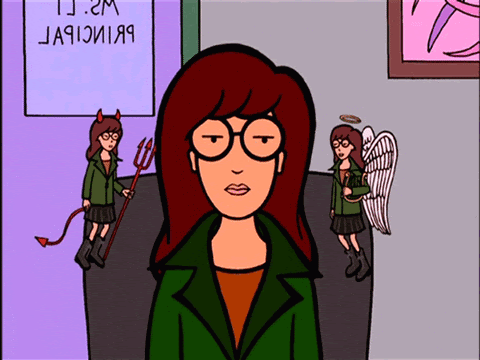Why Daria Doesn’t Need a Reboot
- Corey M. Floyd

- Oct 13, 2025
- 4 min read

In the ever-turning wheel of television nostalgia, reboots have become a hallmark of modern programming. Iconic shows of the past are frequently revisited, reimagined, and revived for new audiences. Among these, Daria, MTV’s animated cult classic that aired from 1997 to 2002, often emerges in discussions of potential revivals. But while Daria remains beloved by many, a reboot risks diluting the essence that made it special. The original Daria is a cultural time capsule, deeply rooted in the socio-political landscape of the late 1990s. Rebooting it now risks not only compromising its integrity but also misrepresenting its nuanced, era-specific satire.

Daria was a product of Generation X cynicism. It channeled the disillusionment of the late ’90s, a time when mainstream culture was being increasingly scrutinized and the internet was still in its infancy. Daria Morgendorffer’s deadpan critique of conformity, capitalism, and superficiality mirrored a very specific societal mood. Rebooting the show in today’s vastly different cultural landscape would not only miss the tone of the original, but it would also clash with modern sensibilities in ways that feel forced or pandering.

The issues that Daria tackled—apathy, media shallowness, performative popularity—are still relevant but are now expressed through vastly different paradigms, including social media and hyper-political activism. Daria’s brand of cool detachment may not resonate in a time where performative engagement and constant self-branding are the norm. Updating her to reflect current trends risks fundamentally altering her character or making her feel like a relic attempting to be relevant.

Hollywood reboots often fail to capture the core of what made the original successful. They tend to modernize the setting, diversify the cast (sometimes superficially), and shoehorn in current issues, often without the same sharpness of wit or subtlety. Daria was never about being trendy or flashy; its quiet, sarcastic intelligence is what endeared it to viewers. A reboot would likely feel compelled to heighten the drama, add romantic entanglements, or over-explain characters’ psychological profiles—all of which would undermine the dry humor and understated storytelling of the original.

Furthermore, Daria was revolutionary in how it portrayed a female protagonist who neither sought popularity nor tried to change herself to fit in. She wasn’t an “antihero” in the way today’s prestige dramas define the term, but she was unapologetically herself. There’s a risk that a modern retelling would feel the need to make Daria "grow" in ways that contradict her essence. That kind of character arc—forced optimism, emotional vulnerability, or social redemption—would betray the grounded, introspective realism the original show championed.

One of the most compelling reasons not to reboot Daria is that the show told a complete story. Over five seasons and two TV movies, we watched Daria grow—not in a grand, life-changing way, but incrementally, realistically. Her relationship with her best friend Jane Lane deepened and sometimes faltered. Her interactions with her family evolved subtly. By the end of the series, Daria hadn’t transformed into someone new; she had simply learned a bit more about herself and others. That modest progression is what made the character arc believable and resonant.
Attempting to pick up where the series left off or to retell it for a modern audience runs the risk of narrative redundancy or, worse, unnecessary elaboration. The ambiguity of Daria’s post-graduation future—her quiet, understated departure into adulthood—was thematically perfect. Reboots often function to answer questions nobody was asking, and Daria’s open-ended finale is precisely what gave it lasting power.

At its core, Daria is a satire of high school life and the culture surrounding it. The rise of social media, digital surveillance, influencer culture, and meme politics would drastically change the environment the characters inhabit. A modern Daria might spend more time online than in the real world. The very premise of a sardonic observer navigating the absurdities of physical, in-person high school life would be unrecognizable.

And if a reboot chooses to place Daria in today’s digital society, it could easily turn her from a witty outsider into a trope: the “snarky girl with a podcast,” the “edgy TikTok user,” or a character obsessed with online discourse. These versions would flatten her complexity and make her fit into already saturated archetypes.

The enduring appeal of Daria lies in its unbending authenticity. It was not created to be part of a franchise, extended universe, or marketing campaign. Its integrity has been preserved by remaining untouched, standing alone as a snapshot of a specific worldview at a specific time. It’s this untouched quality that makes Daria feel timeless, even though it’s deeply rooted in its own era. By resisting the temptation to reboot, Daria avoids the fate of many other shows whose modern counterparts suffer by comparison—Gilmore Girls, The X-Files, and Arrested Development, to name a few. Instead of enhancing the legacy, such reboots often dilute the original’s significance, inviting criticism rather than nostalgia.

Daria was lightning in a bottle: a singular blend of satire, character-driven narrative, and generational commentary. Its strength was its quiet confidence and refusal to cater to trends, which is exactly why it remains so deeply beloved. Rebooting it would do more harm than good, potentially recasting its biting voice into something hollow and overproduced. Rather than reviving Daria, we should let it rest as the cultural artifact it was meant to be—sharp, insightful, and forever relevant in its original form.





Comments